必修1 unit 4
高一英语必修一Unit4单词讲义
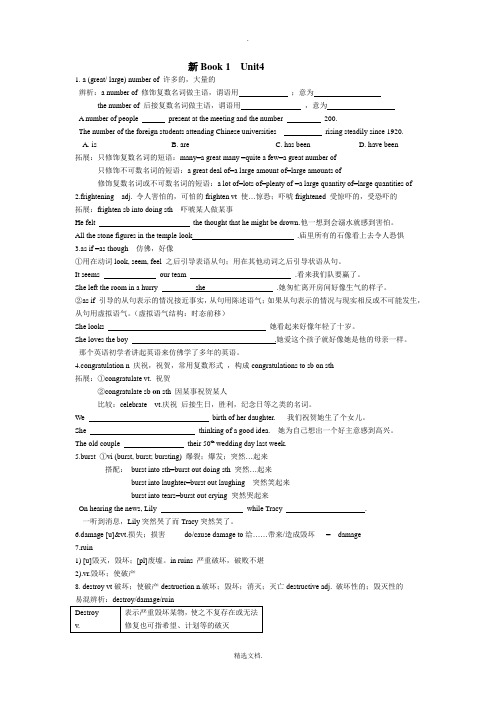
新Book 1 Unit41. a (great/ large) number of 许多的,大量的辨析:a number of 修饰复数名词做主语,谓语用;意为the number of 后接复数名词做主语,谓语用,意为A number of people present at the meeting and the number 200.The number of the foreign students attending Chinese universities rising steadily since 1920.A. isB. areC. has beenD. have been拓展:只修饰复数名词的短语:many=a great many =quite a few=a great number of只修饰不可数名词的短语:a great deal of=a large amount of=large amounts of修饰复数名词或不可数名词的短语:a lot of=lots of=plenty of =a large quantity of=large quantities of 2.frightening adj. 令人害怕的,可怕的frighten vt 使…惊恐;吓唬frightened 受惊吓的,受恐吓的拓展:frighten sb into doing sth 吓唬某人做某事He felt the thought that he might be drown.他一想到会溺水就感到害怕。
All the stone figures in the temple look .庙里所有的石像看上去令人恐惧3.as if =as though 仿佛,好像①用在动词look, seem, feel 之后引导表语从句;用在其他动词之后引导状语从句。
It seems our team .看来我们队要赢了。
人教版高一英语必修一unit4重点单词 短语

人教版高一英语必修一unit4重点单词短语1. devote (v.): To give all or a large part of one's time or resources to a particular person, activity, or cause.- She devoted her life to helping the less fortunate.- He has devoted himself to studying medicine.2. determination (n.): The act of deciding definitely and firmly; the quality of being resolute or firm in purpose.- With great determination, she managed to overcome all the obstacles and achieve her goals.- The team showed great determination in winning the game.3. strategy (n.): A plan of action designed to achieve a long-term or overall aim.- The company developed a new marketing strategy to increase sales.- The coach came up with a winning strategy for the game.4. collaborate (v.): To work together with others on a project or task.- The scientists collaborated on a research project.- The two companies decided to collaborate on a new product.5. launch (v.): To start or set in motion.- The company plans to launch its new product next month.- The government launched an investigation into the corruption scandal.6. generate (v.): To produce or create something.- The wind turbines generate electricity.- His speech generated a lot of excitement among the audience.7. fulfill (v.): To do or achieve what was expected; to satisfy or meet a requirement or condition.- She finally fulfilled her dream of becoming a doctor.- The company fulfilled its promise to deliver the product on time.8. access (v.): To obtain or retrieve information or data.- Students can access online resources through the school's website.- The new software allows users to access files from anywhere.9. inspire (v.): To motivate or encourage someone to do something creative orworthwhile.- Her story inspired many people to volunteer and help others.- The coach's words of encouragement inspired the team to victory.10. overcome (v.): To succeed in dealing with a problem or difficulty.- Despite facing many challenges, he managed to overcome them and achieve success.- The team overcame a 2-0 deficit and won the game.11. privilege (n.): A special right, advantage, or immunity granted or available only to a particular person or group.- It is a privilege to have access to quality education.- Being able to travel is a privilege that not everyone has.12. make a difference (phrase): To have a positive impact or effect on something or someone.- Every small action can make a difference in someone's life.- We need more volunteers to make a difference in our community.13. take action (phrase): To do something in response to a situation or problem.- It's time to stop talking and start taking action.- She took action to help the homeless by starting a charity organization.14. start from scratch (phrase): To begin something from the very beginning, without any prior work or knowledge.- After losing everything, he had to start from scratch and rebuild his life. - The company went bankrupt and had to start from scratch.15. have a passion for (phrase): To have a strong enthusiasm or love for something.- She has a passion for music and plays the piano every day.- He has a passion for cooking and dreams of becoming a chef.16. in pursuit of (phrase): In an attempt to achieve or attain something.- He left his job in pursuit of a more fulfilling career.- They are traveling the world in pursuit of adventure.17. set goals (phrase): To establish specific aims or objectives to be achieved.- It's important to set goals and work towards them.- The team set goals for the upcoming season.18. work towards (phrase): To make efforts to achieve or accomplish something.- She is working towards her degree in law.- We must all work towards a more sustainable future.19. make sacrifices (phrase): To give up something valuable or important for the sake of something else.- He made sacrifices to provide for his family.- They made sacrifices to save money for their dream vacation.20. stay focused (phrase): To maintain concentration and effort on aparticular task or goal.- It's important to stay focused if you want to succeed.- She stays focused on her studies and achieves top grades.21. never give up (phrase): To persist in an endeavor despite difficulties or setbacks.- His determination and refusal to give up led him to success.- She never gives up and always tries her best.22. time management (phrase): The ability to plan and organize one's time effectively.- Good time management is essential for students to balance their studies and social life.- She excels in time management and always meets her deadlines.23. think outside the box (phrase): To think in a creative and unconventional way.- We need to think outside the box to solve this problem.- His innovative ideas come from thinking outside the box.24. take initiative (phrase): To act independently and take charge of a situation without being prompted.- She took the initiative to organize a community clean-up event.- He took initiative and proposed a new project to his boss.25. be committed to (phrase): To be dedicated and loyal to a person, cause, or task.- She is committed to her fitness and goes to the gym every day.- The company is committed to providing excellent customer service.26. pursue a career (phrase): To follow a particular profession or occupation.- He is pursuing a career in engineering.- She pursued a career in journalism after graduating from college.27. achieve success (phrase): To accomplish a desired aim or objective.- Hard work and determination will lead to success.- The team achieved success by winning the championship.28. face challenges (phrase): To encounter difficulties or obstacles that must be overcome.- Starting a business involves facing many challenges.- They faced challenges but worked together to find solutions.29. make progress (phrase): To advance or develop towards a better or more advanced state.- She is making progress in her language learning.- The project is making good progress and should be completed on time.30. have ambitions (phrase): To have strong desires or aspirations for achieving something.- He has ambitions to become a successful entrepreneur.- She has ambitions to travel the world and explore different cultures.31. break new ground (phrase): To do something that has never been done before; to innovate. - The researchers broke new ground with their discovery of a new species.- The company is breaking new ground by investing in renewable energy sources.32. build relationships (phrase): To establish and develop connections with others.- It's important to build relationships with your colleagues for a harmonious work environment. - She has built strong relationships with her clients, which has helped her business grow.33. communicate effectively (phrase): To convey information or ideas clearly and efficiently.- Good communication skills are essential for success in any field.- He communicates effectively with his team, which improves their productivity.34. dream big (phrase): To have ambitious goals or aspirations.- You should dream big and work hard to achieve your goals.- She has always dreamed big andpires to be the first in her family to graduate from college. 35. embrace change (phrase): To accept and welcome change, especially when it is necessary or inevitable.- In order to stay competitive, businesses must embrace change and adapt to new technologies. - He embraces change and sees it as an opportunity for growth and learning.36. exceed expectations (phrase): To perform better than what was expected or required.- She always exceeds expectations in her work, which has earned her a promotion.- The team worked hard and exceeded expectations by finishing the project ahead of schedule.37. give back (phrase): To return a favor or to contribute to a community or cause.- It's important to give back to the community that has supported you.- He gives back by volunteering at a local shelter and helping those in need.38. lead by example (phrase): To set a good example for others to follow.- A good leader leads by example and inspires others to do their best.- She leads by example and is always the first to arrive and the last to leave.39. learn from mistakes (phrase): To gain knowledge or understanding from past failures or errors.- It's okay to make mistakes as long as you learn from them.- The company learned from its mistakes and made improvements to its product.40. maintain balance (phrase): To keep different aspects of one's life in a state of equilibrium.- It's important to maintain a balance between work and personal life.- She maintains balance by setting aside time for her hobbies and spending time with family.41. manage conflict (phrase): To handle disagreements or disputes in a way that is fair and peaceful.- Good managers know how to manage conflict and keep the team working together.- They managed the conflict by sitting down and discussing their differences.42. meet deadlines (phrase): To complete a task or deliver a product by the agreed-upon time.- Meeting deadlines is crucial for maintaining a good reputation with clients.- She always meets her deadlines and is known for her reliability.43. motivate others (phrase): To inspire or encourage others to take action or to work towards a goal.- A good leader knows how to motivate others and bring out their best.- He motivated his team with a vision of success and a plan to achieve it.44. pursue excellence (phrase): To strive for the highest standards and quality in one's work or endeavors.- The company pursues excellence in all aspects of its operations.- She pursues excellence in her craft and is always looking for ways to improve.45. take responsibility (phrase): To accept accountability for one's actions or the outcomes of a situation.- It's important to take responsibility for your mistakes and learn from them.- He took responsibility for the failure of the project and worked to fix the issues.46. think critically (phrase): To analyze situations or problems in a logical and thoughtful way. - Thinking critically is an important skill for problem-solving and decision-making.- She thinks critically about every decision and considers the potential consequences.47. value diversity (phrase): To recognize and appreciate the differences among people.- A diverse workforce brings different perspectives and ideas to the table.- He values diversity and promotes an inclusive work environment.48. work as a team (phrase): To collaborate and cooperate with others to achieve a common goal. - Working as a team can lead to better results and a more positive work environment.- They work as a team and support each other to overcome challenges.49. adapt to change (phrase): To modify or adjust one's behavior, work, or situation in response to new circumstances.- Adapting to change is necessary in a rapidly evolving world.- She has learned to adapt to change and is open to new ideas and approaches.。
英语必修一Unit4单词表(配图和特殊记忆法)

Unit 4 Natural disasters1. disaster 灾难;灾害词根法:dis(前缀,表否定)aster(star的希腊语)➡️星位不正,指灾难2. tornado (复数-oes or -os)龙卷风;旋风拼背法:t 逃or或者na哪do做龙卷风来了,逃或者哪里做个庇护!3. drought 旱灾;久旱词根法:dr(干的dry的缩写)➕后缀ought4. landslide (山地或悬崖的)崩塌;滑坡slide(使)滑行;滑动拼背法:sli胜利de的山体滑坡,死里逃生,胜利的!5. tsunami 海啸拼背法:tsu特殊nami娜米特殊的娜米,可以操控海啸。
6. flood 洪水;大量;淹没;大量涌入;使灌满水;淹没拼背法:f飞l(形)油条(形)oo鸡蛋d的洪水来了,一根油条两个鸡蛋飞了!相似单词:mood 心情food 食物good 好的7. volcanic eruption 火山喷发词根法:volcano火山—volcanic火山的拼背法:vol音量(前缀)➕can能o哦音量能哦的是火山!词根法:erupt爆发—eruption 爆(喷)发8. magnitude (地)震级;重大拼背法:mag马哥ni你吐得马哥你吐得像地震!9. rescue 营救;救援拼背法:re热s死cu醋e鹅热死吃醋的鹅是一种救援。
10. damage 损害;破坏;损坏;损失词根法:dama(征服)➕(a)ge(表行为结果)➡️征服意味着对另一方的破坏词根法2:dam(damn该死的,诋毁的缩写)➕age(名词词根,但语境不同也可表示动词)➡️诋毁会损害他人,但不会完全摧毁拓:与破坏:destroy、ruin的区别destroy:完全摧毁,已没有了当初的模样ruin:也是完全摧毁,但更多表示成为废墟,废墟11. destroy 摧毁;毁灭词根法:de(表相反、否定)➕story(建造的意思)12. evacuate 疏散;撤出;撤离词根法:e(词根ex的简写,向外)➕vac( ️eg.vacation:空出来的日子)➕u引导的形容词后缀“ate”➡️表撤出使变空,即疏散13. helicopter 直升机拼背法:heli(类highly高高地)➕copter(“靠扑腾”,似螺旋桨发出的声音)词根法:helic(螺旋)➕opt(选择)➕er(表机器)➡️选择螺旋上升的机器,即 ️14. death 死;死亡die动词:he died last week。
新版人教版高中英语词汇表必修一 Unit4

词汇表必修一Unit41. disaster/dɪˈzɑ:stə(r)/ n. 灾难;灾害2. tornado /tɔ:ˈneɪdəʊ /n. (pl. -oes or -os) 龙卷风;旋风3. drought/ draʊt / n. 旱灾;久旱4. landslide / ˈlændslaɪd /n.( landfall) (山地或悬崖的)崩塌;滑坡5. slide/ slaɪd / vi. & vt. (使)滑行;滑动6. tsunami / tsu:ˈnɑ:mi /n.海啸7. flood/flʌd /n.洪水;大量vi.淹没;大量涌入vt.使灌满水;淹没8. volcanic eruption / vɔlˈkænɪk ɪˈrʌpʃn / 火山喷发9. magnitude /ˈmægnɪtju:d / n. (地)震级;重大10. rescue/ˈreskju:/ n.& vt.营救;救援11. damage/ˈdæmɪdʒ / vt. 损害;破坏 n.损坏;损失12. destroy/dɪ'strɔɪ/ vt.摧毁;毁灭13. evacuate /ɪˈvækjueɪt /vt. 疏散;撤出 vi.撤离14. helicopter /ˈhelɪkɒptə(r)/ n.直升机15. death / deθ/n. 死;死亡16. affect /ə'fekt/ vt.影响;(疾病)侵袭;深深打动17. shelter/'ʃeltə(r)/ n. 避难处;居所;庇护vt.保护;掩蔽vi.躲避 (风、雨或危险)18. crack /kræk/ n. 裂纹;裂缝vi. & vt. (使)破裂19.as if 似乎;好像;仿佛20. ruin/'ru:ɪn/ n.&vt. 破坏;毁坏21.in ruins 严重受损;破败不堪22. percent/ pəˈsent / n.百分之……adj.&adv.每一百种23. brick/brɪk/n.砖;砖块24. metal/'metl/ n. 金属25. shock/ʃɒk/ n. 震惊;令人震惊的事;休克vt.(使)震惊26.in shock 震惊;吃惊27. electricity/ɪˌlekˈtrɪsəti/ n. 电;电能28. trap/træp/vt. 使落入险境;使陷入圈套n.险境;陷阱29. bury/ˈberi/ vt.埋葬;安葬30. breathe/ bri:ð/ vi.& vt.呼吸31. revive /rɪˈvaɪv/vt.& vi.复活;(使)苏醒32. revival /rɪˈvaɪvl/ n. 振兴;复苏33. effort/'efət/n. 努力;艰难的尝试;尽力34. unify /ˈju:nɪfaɪ / vi.& vt.统一;(使)成一体35. wisdom/ˈwɪzdəm/n. 智慧;才智36. context/ˈkɒntekst/ n. 上下文;语境;背景37. suffer/ˈsʌfə/ vt. 遭受;蒙受vi. (因疾病、痛苦、悲伤等)受苦38. volcano/vɒlˈkeɪnəʊ/n.(pl. -oes or -os)火山39. erupt/ɪˈrʌpt/ vi.& vt. (火山)爆发;(岩浆、烟等)喷出40. supply/səˈplaɪ/ n. 供应(量);补给;[pl.] 补给品vt.供应;供给41. typhoon/taɪˈfu:n/n. 台风42.in the open air 露天;在户外43. hurricane/ˈhʌrɪkən/ n .(尤指大西洋的)飓风44. survive/səˈvaɪv/ vi. 生存;存活 vt. 幸存;艰难度过45. power/ˈpaʊə(r)/ n. 电力供应;力量;控制力46. tap /tæp/ vi.& vt.轻叩;轻敲;轻拍n.水龙头;轻叩;轻敲47. pipe/paɪp/n. 管子;管道48. whistle /ˈwɪsl/ vi. 吹口哨;发出笛声vt.吹口哨n.哨子(声);呼啸声49. emergency/iˈmɜ:dʒənsi/n. 突发事件;紧急情况50. calm/kɑ:m/adj. 镇静的;沉着的 vt.使平静;使镇静51. aid /eɪd/ n. 援助;帮助;救援物资 vi.& vt. (formal) 帮助;援助52. kit /kɪt/n. 成套工具;成套设备53.first aid kit 急救箱54.on hand 现有(尤指帮助)55. crash/kræʃ/ vt.& vi.碰撞;撞击 n.撞车;碰撞56. sweep/swi:p/vt. & vi. ( swept, swept) 打扫;清扫57.sweep away 消灭;彻底消除58. wave/weɪv/ n. 海浪;波浪vi.& vt.挥手;招手59. strike/straɪk/ vi.& vt. (struck, struck/stricken) 侵袭;突击;击打n. 罢工;罢课;袭击60. deliver/dɪˈlɪvə(r)/ vt. & vi.递送;传达vt.发表61. summary/ˈsʌməri/ n. 总结;概括;概要62. effect/ɪˈfekt/ n. 影响;结果;效果63. length/leŋθ/n. 长;长度。
新人教版高中英语必修一Unit4单词及课文录音
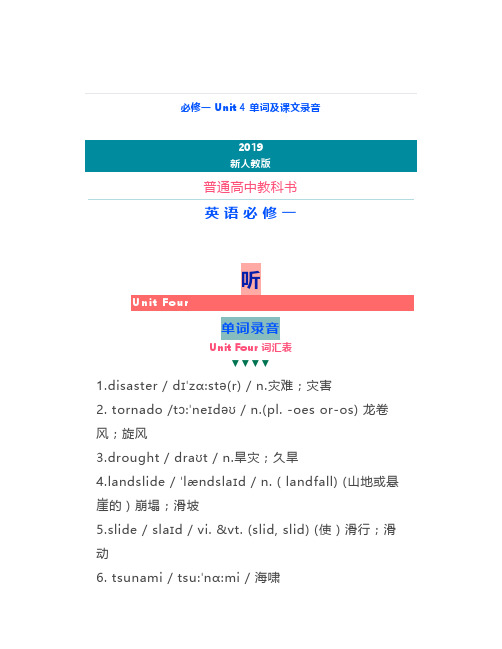
必修一 Unit 4 单词及课文录音2019普通高中教科书英语必修一听单词录音Unit Four 词汇表▼▼▼▼1.disaster / dɪˈzɑ:stə(r) / n.灾难;灾害2. tornado /tɔ:ˈneɪdəʊ / n.(pl. -oes or-os) 龙卷风;旋风3.drought / draʊt / n.旱灾;久旱ndslide / ˈlændslaɪd / n. ( landfall) (山地或悬崖的)崩塌;滑坡5.slide / slaɪd / vi. &vt. (slid, slid) (使)滑行;滑动6. tsunami / tsu:ˈnɑ:mi /海啸7.flood / flʌd / n. 洪水;大量 vi.淹没;大量涌入 vt使灌满水;淹没8.volcanic eruption / vɔlˈkænɪk ɪˈrʌpʃən / 火山喷发9. magnitude / ˈmægnɪtju:d / n. (地)震级;重大10. rescue / ˈreskju: / n.&vt. 营救;救援11. damage / ˈdæmɪdʒ / vt. 损害;破坏 n.损坏;损失12.destroy/dɪ’strɔɪ/ vt. 摧毁;毁灭13.evacuate / ɪˈvækjueɪt / vt. 疏散;撤出 vi. 撤离14.helicopter / ˈhelɪkɒptə(r)/ n. 直升机15. death/ deθ/ n.死;死亡16.affect /ə’fekt/ vt.影响;(疾病)侵袭;深深打动17.shelter/’ʃeltə/ n.避难处;居所;庇护 vt.保护;掩蔽vi. 躲避(风、雨或危险)18. crack /kræk/ n.裂纹;裂缝 vi. &vt. (使)破裂19.as if 似乎;好像;仿佛20.ruin /’ru:ɪn/ n. &vt. 破坏;毁坏 in ruins严重受损;破败不堪21.percent / pəˈsent / n. 百分之….22.brick /brɪk/ n. 砖;砖块23.metal /’metl/ n.金属24.shock /ʃɒk/ n.震惊;令人震惊的事;休克 vt (使)震惊25.electricity / ɪˌlekˈtrɪsəti / n.电;电能26.trap /træp/ vt.使落入险境;使陷入圈套 n. 险境;陷阱27. bury / ˈberi / vt. 埋葬;安葬28.breathe / bri:ð / vi.&vt.呼吸29.revive / rɪˈvaɪv / vt.& vi复活;(使)苏醒30.revival / rɪˈvaɪvl/ n. 振兴;复苏31.effort /’efət / n.努力;艰难的尝试;尽力32.unify / ˈju:nɪfaɪ / vi.&vt. 统一;(使)成一体33.wisdom / ˈwɪzdəm / n. 智慧;才智34.context/ ˈkɒntekst / n. 上下文;语境;背景35.suffer / ˈsʌfə(r) / vt. 遭受;蒙受 vi. ( 因疾病、痛苦、悲伤等)受苦suffer from 因……而痛苦;患有(疾病等)36.volcano / vɒlˈkeɪnəʊ / n. 火山37.erupt / ɪˈrʌpt / vi.&vt. ( 火山)爆发;(岩浆、烟等)喷出38.supply / səˈplaɪ / n.供应(量);补给;[pl.] 补给品 vt. 供应;供给39.typhoon / taɪˈfu:n / n.台风40.in the open air 露天;在户外41.hurricane / ˈhʌrɪkən / n . ( 尤指大西洋的)飓风42. survive / səˈvaɪv/ vt. 幸存;艰难度过 vi.生存;存活43. power / ˈpaʊə(r) / n.电力供应;力量;控制力44. tap / tæp/ vi.&vt.轻叩;轻敲;轻拍 n.水龙头;轻叩;轻敲45.pipe/ paɪp/ n.管子;管道46.whistle / ˈwɪsl / vi.吹口哨;发出笛声 vt.吹口哨 n. 哨子(声);呼啸声47.emergency/ iˈmɜ:dʒənsi / n. 突发事件;紧急情况48. calm / kɑ:m / adj.镇静的;沉着的 vt. 使平静;使镇静48.aid / eɪd / n.援助;帮助;救援物资vi.&vt. (formal) 帮助;援助49.kit / kɪt / n. 成套工具;成套设备firstaid kit 急救箱50. on hand现有(尤指帮助)51.crash / kræʃ/ vi.&vt. 碰撞;撞击 n. 撞车;碰撞55. sweep /swi:p/ vt.&vi. ( swept,swept) 打扫;清扫sweepaway消灭;彻底消除56.wave / weɪv / n.海浪;波浪vi.&vt. 挥手;招手57. strike / straɪk / vi.&vt.(struck,struck/stricken)侵袭;突击;击打n. 罢工;罢课;袭击58.deliver/ dɪˈlɪvə(r) / vt.& vi.递送;传达 vt. 发表59. summary /ˈsʌməri / n. 总结;概括;概要60.effect / ɪˈfekt / n.影响;结果;效果61.length/ leŋθ/ n.长;长度课文录音Unit FourNatural Disasters原文,录音及翻译Reading and Thinking 录音THE NIGHT THE EARTH DIDN’T SLEEP地球的一个不眠之夜Strange things were happening in the countryside of northeastern Hebei. For several days,the water in the village wells rose and fell,rose and fell. There were deep cracks that appeared in the well walls. At least one well had some smelly gas coming out of it. Chickens and even pigs were too nervousto eat,and dogs refused to go inside buildings. Mice ran out of the fields looking for places to hide,and fish jumped out of the water. At about 3:00 a.m., on 28 July 1976,bright lights were seen in the sky outside the city of Tangshan and loud noises were heard.But the city’s one million people were asleep as usual that night.河北省东北部的农村地区怪事连连。
人教版高一英语必修一unit4知识点、练习及答案
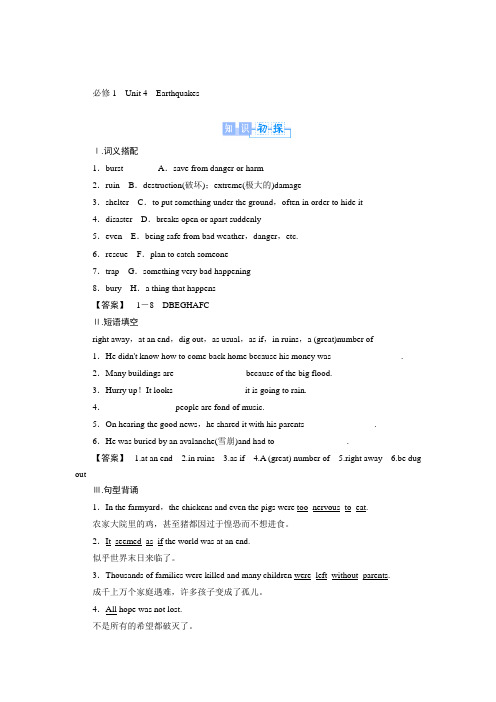
必修1 Unit 4EarthquakesⅠ.词义搭配1.burst A.save from danger or harm2.ruin B.destruction(破坏);extreme(极大的)damage3.shelter C.to put something under the ground,often in order to hide it4.disaster D.breaks open or apart suddenly5.even E.being safe from bad weather,danger,etc.6.rescue F.plan to catch someone7.trap G.something very bad happening8.bury H.a thing that happens【答案】1-8DBEGHAFCⅡ.短语填空right away,at an end,dig out,as usual,as if,in ruins,a (great)number of1.He didn't know how to come back home because his money was________________.2.Many buildings are ________________because of the big flood.3.Hurry up!It looks ________________it is going to rain.4.________________people are fond of music.5.On hearing the good news,he shared it with his parents________________.6.He was buried by an avalanche(雪崩)and had to ________________.【答案】 1.at an end 2.in ruins 3.as if 4.A (great) number of 5.right away 6.be dug outⅢ.句型背诵1.In the farmyard,the chickens and even the pigs were too_nervous_to_eat.农家大院里的鸡,甚至猪都因过于惶恐而不想进食。
必修一unit4词汇讲解

learned b__y_t_h_e_e_n_d__o_f_ last term?
4. In fifteen terrible seconds a large city
4) He r_u_i_n_e_d_ his girl friend’s prospects (前景,期望). 5) Soft wood d_a_m__a_g_e_s_ easily.
5. Two-thirds of them died or were injured
during the earthquake. 2/3的人在地震中死去或受伤。 【例句】
6. People were shocked. 人们惊呆了。
Shock vt 使震惊, 使惊骇 +sb
拓展: shocked adj 震惊的,惊讶的
shocking adj. 令人震惊的
be shocked at /by sth. 对… 吃惊 be shocked to do sth. 做某事很吃惊 1) They had been shocked to hear / learn
at a frightening rate.
damage多指对无生命物体的损害, 造成降 低价值、破坏功能等后果。
e.g. Many buildings were badly damaged during the war.
ruin多指因外部原因而受到严重破坏或毁 灭, 侧重破坏的彻底性, 也可用于引申意义。 e.g. Her injury ruined her chances of
【人教版】高中英语必修一Unit-4单元知识点

必修一Unit4 Earthquakes1、In the city, the water pipes in some buildings crashed and burst. 城市里,一些大楼里的水管爆裂。
burst爆裂,突发The square is bursting with tourists。
广场上到处都是游客。
I felt as if my heart would burst with joy。
我觉得自己高兴得心花怒放。
The police burst through the door。
警察破门而入。
There was a burst of laughter in the next room. 隔壁房间里突然爆发出一阵笑声。
联想扩展:(1) burst in on…突然打断He burst in on our conversation. 他突然打断了我们的谈话。
(2)burst into +n。
突然…The speaker burst into angry speech. 演讲者突然讲粗话.(3) burst out + doing突然…The woman burst out crying like a child. 那个妇女突然像小孩一样哭了。
(4)burst to do sth. 迫切想做某事I am bursting to tell you the news. 我迫不及待的想告诉你这个消息。
2、But the one million people of the city,who thought little of these events, were asleep as usual that night。
但是认为这没什么的一百万城里人,那天晚上还像往常一样睡觉。
affair,event,accident,incident,matter, businessaffair 指要做的事或已经发生的事。
高中英语必修一UNIT4知识点归纳及练习(附答案

6.But the one million people of the city, who thought little of these events, were asleep as usual that
night.
可是, 个城市的一百万居民都没有把 些状况当一回事,当日夜晚照旧睡着了。
9.__________ have known the results of the exam.
A. It seemed to B. It seemed to him to C. He seemed that he D. He seemed to
人 地球表面是一些板 。
27.hold up起;托住;支撑;使阻滞;耽 ;提出;阻 ;列 ,推 ;(理 等)得住
Women can hold up half of the sky.女能 半 天。
28.make up弥,虚假,制,整理,包装,和解,,化,足,拼集
Farm workers make up only a small section of the population.
民只占人口的一小部分.
The boy made up a story; it was not true男.孩 了个故事, 故事不是真的。
29.The judge gave a prize and his congratulations to the cyclist who won the competition裁.判把 金 得比 的自行 手,并向他祝 。
二、
(一)
1. The rich_____ not always happy.
A. isB. areC. hasD. have
高一英语必修一unit4单词表

Unit 4 单词表1. absolute [ˈæbsəluːt] adj.完全的;绝对的2. achieve [əˈtʃiːv] v.完成;实现3. advantage [ədˈvɑːntɪdʒ] n.优势;有利条件4. alternative [ɔːlˈtɜːrnətɪv] n.替代(方案)5. analyze [ˈænəlaɪz] v.分析6. attempt [əˈtempt] v.尝试;努力7. background [ˈbækɡraʊnd] n.背景;背景资料8. balance [ˈbæləns] v.平衡9. capable [ˈkeɪpəbl] adj.有能力的;能干的10. career [kəˈrɪr] n.事业;[特指]职业11. challenge [ˈtʃæləndʒ] n.挑战12. characteristic [ˌkærəktəˈrɪstɪk] adj.典型的;特有的13.bination [ˌkɒmbɪˈneɪʃn] n.结合;联合14.munication [kəˌmjuːnɪˈkeɪʃn] n.交流;通讯15.munity [kəˈmjuːnətɪ] n.社区;社会16.pare [kəmˈpeə(r)] v.比较17.pete [kəmˈpiːt] v.竞争18. concentrate [ˈkɒnsəntreɪt] v.集中19. confident [ˈkɒnfɪdənt] adj.有信心的20. connect [kəˈnekt] v.连接21. conscious [ˈkɒnʃəs] adj.意识到的;有意的22. convenient [kənˈviːniənt] adj.方便的23. convert [kənˈvɜːt] v.转变;转换24. crucial [ˈkruːʃəl] adj.至关重要的25. culture [ˈkʌltʃə(r)] n.文化26. decade [ˈdekeɪd] n.十年27. define [dɪˈfaɪn] v.定义28. deliver [dɪˈlɪvə(r)] v.交付;递送29. demonstrate [ˈdemənstreɪt] v.演示;证明30. derive [dɪˈraɪv] v.源于;得自31. design [dɪˈzaɪn] v.设计32. desire [dɪˈzaɪə(r)] n.欲望33. destroy [dɪˈstrɔɪ] v.毁灭34. detect [dɪˈtekt] v.发现35. develop [dɪˈveləp] v.发展36. dimension [daɪˈmenʃn] n.维度;方面37. direct [dəˈrekt] adj.直接的;直率的38. discover [dɪˈskʌvə(r)] v.发现39. discuss [dɪˈskʌs] v.讨论40. diverse [daɪˈvɜːs] adj.不同的;多种多样的41. dynamic [daɪˈnæmɪk] adj.动态的;有活力的42. economy [ɪˈkɒnəmi] n.经济43. edit [ˈedɪt] v.编辑44. element [ˈelɪmənt] n.元素;要素45. emotion [ɪˈməʊʃn] n.情感46. enable [ɪˈneɪbl] v.使能够;使可能47. energy [ˈenədʒi] n.能量;精力48. environment [ɪnˈvaɪrənmənt] n.环境49. equipment [ɪˈkwɪpmənt] n.设备;装备50. establish [ɪˈstæblɪʃ] v.建立51. estimate [ˈestɪmət] v.估计52. evaluate [ɪˈvæljueɪt] v.评估53. evidence [ˈevɪdəns] n.证据54. evolve [ɪˈvɒlv] v.发展;进化55. examine [ɪɡˈzæmɪn] v.检查;调查56. expand [ɪkˈspænd] v.扩大;扩展57. expl本人n [ɪkˈspleɪn] v.解释58. exploit [ɪkˈsplɔɪt] v.利用59. external [ɪkˈstɜːnl] adj.外部的;外面的60. facilitate [fəˈsɪlɪteɪt] v.促进;使便利61. factor [ˈfæktə(r)] n.因素62. feature [ˈfiːtʃə] n.特征;特点63. focus [ˈfəʊkəs] v.聚焦;集中64. function [ˈfʌŋkʃən] n.功能;作用65. generate [ˈdʒenəreɪt] v.产生;引起66. govern [ˈɡʌvən] v.管理;统治67. guarantee [ˌɡærənˈtiː] v.保证;担保68. highlight [ˈhaɪlaɪt] v.强调;使突出69. hypothesis [haɪˈpɒθəsɪs] n.假设70. identical [aɪˈdentɪkl] adj.相同的;一模一样的71. identify [aɪˈdentɪfaɪ] v.确定;识别72. ignore [ɪɡˈnɔː] v.忽视;忽略73. illustrate [ˈɪləstreɪt] v.说明;举例说明74. impact [ˈɪmpækt] n.影响75. implement [ˈɪmplɪment] v.实施;执行76. imply [ɪmˈplaɪ] v.暗示;意味着77. initial [ɪˈnɪʃl] adj.最初的78. innovate [ˈɪnəveɪt] v.创新;革新79. inspect [ɪnˈspekt] v.检查80. inspire [ɪnˈspaɪə(r)] v.激发;鼓舞81. instruct [ɪnˈstrʌkt] v.指导;教导82. integrate [ˈɪntɪɡreɪt] v.整合;结合83. interpret [ɪnˈtɜːprɪt] v.解释;理解84. introduce [ˌɪntrəˈdjuːs] v.介绍;引进85. invest [ɪnˈvest] v.投资86. involve [ɪnˈvɒlv] v.涉及;使参与87. issue [ˈɪʃuː] n.问题;议题88. justify [ˈdʒʌstɪfaɪ] v.证明…的合理性89. label [ˈleɪbl] n.标签;标记90. m本人nt本人n [meɪnˈteɪn] v.保持;维持91. manipulate [məˈnɪpjuleɪt] v.操纵;操作92. maximize [ˈmæksɪmaɪz] v.最大化93. modify [ˈmɒdɪfaɪ] v.修改;更改94. monitor [ˈmɒnɪtə(r)] v.监测;监控95. motive [ˈməʊtɪv] n.动机96. negate [nɪˈɡeɪt] v.否定97. negotiate [nɪˈɡəʊʃieɪt] v.谈判;协商98. obt本人n [əbˈteɪn] v.获得99. occupy [ˈɒkjʊpaɪ] v.占据;占领100. occur [əˈkɜː(r)] v.发生以上是高一英语必修一unit4的单词表。
【高中英语教材知识梳理】必修一 Unit 4

Unit 4EarthquakesⅠ.单词语境记忆1.ruin the crop毁坏庄稼2.destroy the whole city 摧毁整个城市3.rescue him from the fire 从大火中救出他4.bury oneself in books 埋头读书5.judge a book by its cover 凭封面判断一本书6.be trapped in ruins 被困在废墟中7.bring great sufferings to sb 给……带来了巨大痛苦8.cause great damage to many old buildings对许多旧建筑造成了巨大的破坏Ⅱ.词性转换与派生记忆1.burst v i.爆裂;爆发→n.突然破裂;爆发2.nation n.民族;国家;国民→national adj.民族的;国家的;国民的→nationality n.国籍3.shock v t.& v i.(使)震惊;震动n.休克;打击;震惊→shocking adj.令人震惊的→shocked adj.感到震惊的4.injure v t.损害;伤害→injury n.伤害;损害→injured adj.受伤的5.express v t.表示;表达n.快车;速递→expression n.表达;表情6.congratulation n.祝贺;(复数)贺词→congratulate v t.祝贺7.sincerely ad v.真诚地;真挚地→sincere adj.真诚的;真挚的Ⅲ.单词趣味串记1.On hearing the result of the match,she burst out crying while there was a burst of laughter in the next room.听到比赛的结果,她突然哭了起来,而隔壁房间里传来一阵笑声。
2.The storm ruined the crops,and the whole village was almost in ruins after the hurricane.暴风雨毁坏了庄稼,整个村子在飓风过后几乎变成了废墟。
高一英语必修一unit4单词表

高一英语必修一unit4单词表
摘要:
1.单元概述
2.单词表内容
3.单词记忆方法
4.练习建议
正文:
一、单元概述
在本单元中,我们将学习英语必修一Unit 4 的主题,这个单元主要涉及到了一些日常交流的基本话题,例如问候、介绍、询问时间等。
通过学习这个单元,学生可以掌握一些基本的英语交际用语,提高自己的英语口语表达能力。
二、单词表内容
在这个单元中,我们需要学习的单词表如下:
1.greet(问候)
2.introduce(介绍)
3.ask(询问)
4.time(时间)
5.clock(钟)
6.watch(手表)
7.schedule(计划)
8.activity(活动)
9.busy(忙碌)
10.free(空闲)
三、单词记忆方法
为了更好地记忆这些单词,我们可以采用以下方法:
1.联想记忆法:通过将单词与生活中的实际场景、形象的图片或其他单词联系起来,提高记忆效果。
例如,可以将“greet”与实际的问候场景相联系,或者将“introduce”与“present”(介绍)联系起来。
2.制定学习计划:每天学习一定数量的单词,并定期复习。
这样可以帮助我们巩固记忆,防止遗忘。
3.多读多写:通过阅读和书写,将单词放入实际语境中,加深对单词的理解和记忆。
四、练习建议
为了更好地掌握这些单词,我们可以进行以下练习:
1.朗读单词,熟悉发音。
2.用所学单词造句,练习口语表达能力。
3.与同学或老师进行对话练习,提高实际交际能力。
4.做一些词汇练习题,巩固所学知识。
人教版高中英语必修第一册 UNIT 4 NATURAL DISASTERS Ⅰ
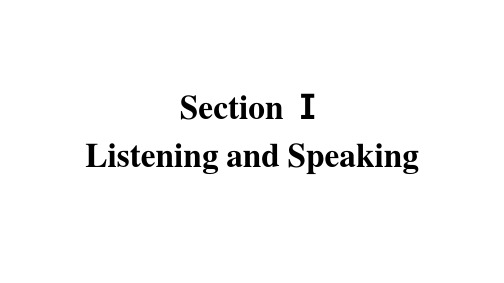
2.【教材原文】Which buildings were damaged in Seoul?
(page 48) 首尔的哪些建筑物遭到了破坏? 考点damage vt.损害;破坏 n.损坏;损失 do/cause damage to 对……造成损害 damage n.损害赔偿金(常用复数)
语境领悟
(4)We were sheltering from the rain in a doorway at that time.
那时我们正在一个门口避雨。学以致用 完成句子 (1)我们应该找个避风的地方。 We should find a shelter from the wind. (2)人们种树使这个地区免受强沙尘暴的侵袭。 Trees were planted to shelter the area from strong sandstorms. (3)我们坐在树下,躲避日晒。 We sat under the tree, sheltering from the sun.
(3)They came to our rescue and pulled us out of the river. 他们来救我们,把我们从河里拉了出来。
学以致用 完成句子 (1)村民们把迷路的游客救了出来。 The villagers rescued the tourists who lost their way. (2)他们拯救了那艘船使其避免下沉。 They rescued the ship from sinking .
4.【教材原文】82 killed,500,000 affected(page 49) 82人死亡,50万人受到影响 考点affect vt.影响;(疾病)侵袭;深深打动 be affected by heat/cold 中暑/着凉 be affected with high fever 发高烧 be greatly/deeply affected by 被……深深打动 effect n.效应;影响 have an effect on 对……有影响 affection n.喜爱;钟爱
高中英语人教版必修一:Unit 4笔记

【Unit 4笔记】1.rescue n .& vt .营救;救援come to/go to sb 's rescue =rescue sb . 援救某人 rescue …from … 把……从……营救出来What are the rescue workers and soldiers doing in the flood -hit area ?救援人员和士兵在洪水灾区做什么?When we were trapped in the ruins ,the soldiers came to our rescue .当我们被困在废墟中时,士兵们赶来救援。
The firefighters rescued five children from the burning house yesterday .昨天,消防人员把5个孩子从失火的房子中解救出来。
♥As soon as the accident happened , the rescue team came to the victims ’ rescue , and they didn ’t give up any hope of rescuing them from danger .事故一发生,救援队就来营救受害者了,并且他们没有放弃使他们脱离危险的任何希望。
2.damage vt .损害;破坏 n .损坏;损失(1)do/cause damage to … 对……造成损害(2)damage one 's health 损害某人的健康Which buildings were damaged in Seoul ?首尔哪些建筑被毁?This could cause serious damage to our environment .这可能会对我们的环境造成严重的破坏。
Damage caused by the earthquake disaster is very terrible .地震灾害造成的破坏太严重了。
人教版高一英语必修一unit4 课文翻译和知识点详解
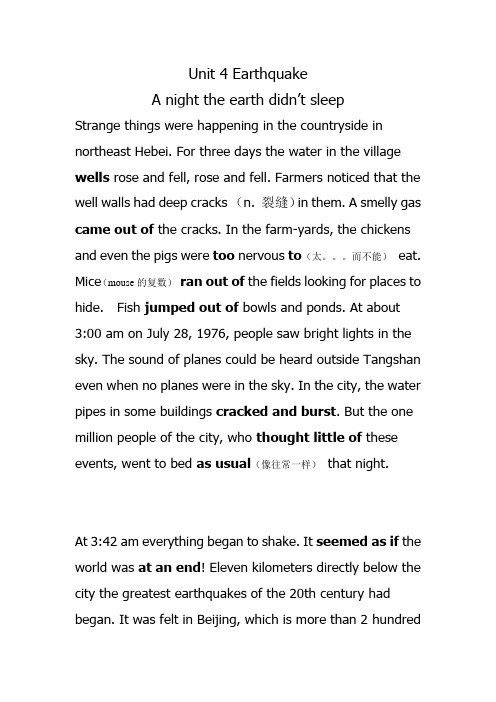
Unit 4 EarthquakeA night the earth didn’t sleepStrange things were happening in the countryside in northeast Hebei. For three days the water in the village wells rose and fell, rose and fell. Farmers noticed that the well walls had deep cracks (n. 裂缝)in them. A smelly gas came out of the cracks. In the farm-yards, the chickens and even the pigs were too nervous to(太。
而不能)eat. Mice(mouse的复数)ran out of the fields looking for places to hide. Fish jumped out of bowls and ponds. At about 3:00 am on July 28, 1976, people saw bright lights in the sky. The sound of planes could be heard outside Tangshan even when no planes were in the sky. In the city, the water pipes in some buildings cracked and burst. But the one million people of the city, who thought little of these events, went to bed as usual(像往常一样)that night.At 3:42 am everything began to shake. It seemed as if the world was at an end! Eleven kilometers directly below the city the greatest earthquakes of the 20th century had began. It was felt in Beijing, which is more than 2 hundredkilometers away. One - third of the nation felt it. A huge crack that was eight kilometers long and thirty meters wide cut across houses, roads and canals. Steam burst from holes in the ground. Hard hills of rock became rivers of dirt. In fifteen terrible seconds a large city lay in ruins. The suffering of the people was extreme. Two-thirds of them died or were injured during the earthquake. Thousands of families were killed and many children were left without parents. The number of people who were killed or seriously injured reached more than 400,000.But how could the survivors believe it was natural? Everywhere they looked nearly everything was destroyed. All of the city’s hospitals, 75% of its factories and buildings and 90% of its homes were gone. Bricks covered the ground like red autumn leaves. No wind, however, could blow them away. Two dams fell and most of the bridges also fell or were not safe for traveling. The railway tracks were now useless piece of steel. Tens of thousands of cows would never give milk again. Half a million pigs and millions of chickens were dead. Sand now filled the wells instead of(代替,取代) water. People were shocked. Then,later that afternoon, another big quake shook Tangshan. Some of the rescue workers and doctors were trapped under the ruins. More buildings fell down. Water, food, and electricity were hard to get. People began to wonder how long the disaster would last(宾语从句).All hope was not lost. Soon after the quakes, the army sent 150,000 soldiers to Tangshan to help rescue workers. Hundreds of thousands of people were helped.The army organized teams to dig out those who were trapped to bury the dead. To the north of the city, most of the 10,000 miners were rescued from the coal mines there. Workers built shelters for survivors whose homes had been destroyed. Fresh water was taken to the city by train, truck and plane. Slowly, the city began to breathe again.词汇:1.飓风hurricane 龙卷风tornado台风typhoon 干旱drought2.警报alarm 潮湿的humid 湿气humidity 现象phenomenon3.摇;震动shake 爆炸burst 废墟ruin损害injure4.破坏destroy 无用的useless 使震惊shock 地震quake/earthquake5.救援rescue 灾难disaster短语:1.雷电交加thunder and lightning 温室效应weather forcast2.全球变暖global warming 立刻,马上right away3.平静下来calm down 爆发burst out4.突然burst into 废墟in ruins5.挖掘dug out 分发,发出give out6.为。
高中英语必修一unit4课文

高中英语必修一unit4课文教学目标:1、让学生掌握与“灾难”相关的词汇和表达方式。
2、了解地震的基本成因和应对方法。
3、培养学生的阅读能力和分析能力。
4、培养学生的灾难意识和自我保护意识。
教学内容:5、词汇:掌握与“灾难”相关的词汇,如earthquake,disaster,flood,fire,tsunami等。
6、阅读:阅读一篇关于地震成因和应对方法的文章。
7、听力:听一段与地震相关的音频,了解地震的基本知识。
8、写作:根据所学知识,写一篇关于地震的短文。
教学步骤:Step 1: Warm-up(5 minutes)9、与学生进行简单的问候和交流,了解他们的兴趣和爱好。
10、通过展示一些与“灾难”相关的图片,引导学生谈论他们所了解的灾难类型和影响。
11、引入本单元的主题:“灾难”。
Step 2: Vocabulary (10 minutes)12、教师出示一些与“灾难”相关的词汇,如earthquake,disaster,flood,fire,tsunami等,并让学生掌握这些词汇的发音和意思。
13、教师将这些词汇放入句子中,让学生进行翻译和运用。
Step 3: Reading (20 minutes)14、教师让学生快速阅读一篇关于地震成因和应对方法的文章,并回答以下问题:•What is the cause of earthquakes?•What should we do to prepare for an earthquake?•What should we do after an earthquake?15、教师引导学生深入分析文章内容,掌握文章的主旨和细节信息。
16、教师出示一些与文章内容相关的词汇和表达方式,让学生进行记忆和应用。
Step 4: Listening (10 minutes)17、教师播放一段与地震相关的音频,让学生了解地震的基本知识。
18、教师让学生回答以下问题:•What is the difference between an earthquake and a tremor?•What should you do during an earthquake?•What should you do after an earthquake?19、教师引导学生总结音频中的重点内容,加深学生对地震知识的理解。
高一必修第一册Unit 4 Natural Disasters
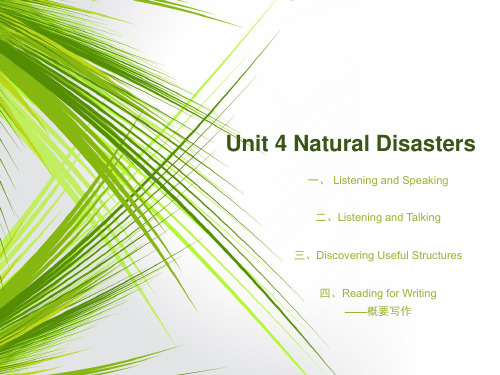
2.Pronunciation (1)听录音,对比发音
清辅音 /p/ /t/ /k/ /f/ /s/ /θ/ /ʃ/ /tʃ/ /tr/ /ts/
浊辅音 /b/ /d/ /ɡ/ /v/ /z/ /ð/ /ʒ/ /dʒ/ /dr/ /dz/
(2)听词汇辨-ed结尾的发音
第一组: reached,kissed,talked,washed,finished,helped
主题语境——人与自然之灾害防范
【语境概说】 本单元的主题是人与自然,涉及的话题是自然灾害与防 范、安全常识与自我保护。单元话题可以使学生了解自然灾害,培养 学生的灾害防范意识,对学生进行防灾减灾教育。同时,鼓励学生开 展小组活动,增强合作意识。
Misfortunes tell us what fortune is.不经灾难不知 福。 The last drop of humans will be tears of regret after environmental damage. 人类的最后一滴水将是环境破坏后悔恨的眼泪。 Nature is kind of a loving mother,but also a butcher in cold blood. 自然不仅是慈爱的母亲,也是冷血的屠夫。
Ⅱ.短语 1.rescue team 救援队 2.donate...to... 向……捐赠…… 3.rebuild one’s home 重建某人的家园 4.take on a new look 呈现新面貌 5.put up 搭建;张贴;提高
Unit 4 Natural Disasters
一、 Listening and Speaking
二、Listening and Talking
三、Discovering Useful Structures
高一英语必修一-unit4-单词

用end构成的短语填空。 The cold weather at last stopped ____________ at the end of March. Our hunt for a cheaper but larger house is at last ________. at an end If you go on with work, you’ll succeed _________. in the end How many English words had you by the end of last term? learned ____________
单词积累:shocking 令人震惊的,令人吃惊的
shocked 震惊的,吃惊的
短语:be shocked by/at 对…感到吃惊
eg: 对这个消息他并未感到吃惊。
He wasn’t shocked by/at this news.
辨析:shock, surprise
即时练习 单句改错 1.We know Bob had cancer ,but it still came as ^shock when he died.
6. in ruins 严重受损/毁坏 eg. An earthquake left the whole town in ruins. ruin n.废墟(常用复数形式)vt. 毁灭 eg. The storm ruined the crops. 暴风雨毁坏了庄稼
destroy ; damage ; ruin 的区别 destroy 指彻底毁坏以至难以修复 damage 指部分损坏还可以修复 ruin 多用于借喻中, 泛指一般的“弄坏了 ” 即时练习: A after the war. 1. The village ___ A. lay in ruins B. lay at ruins C. lay in ruin D. lied in ruins C in the accident is 2. The car which was ___ being repaired in the garage. A. hurt B. ruined C. damaged D. destroyed
人教版新课标英语必修1 Unit 4单词表
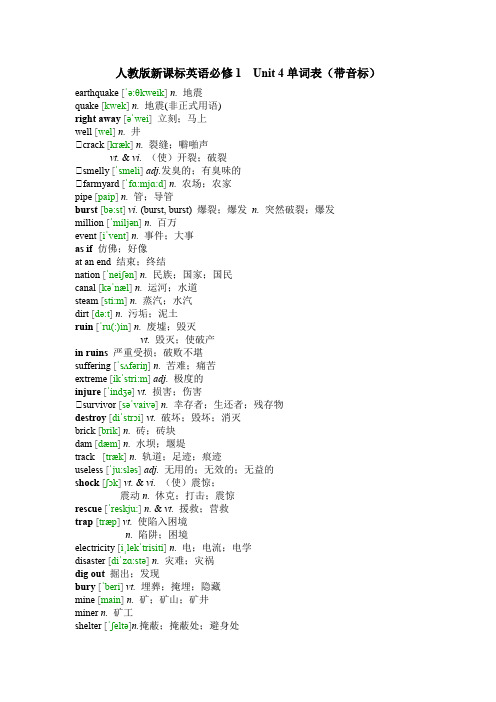
人教版新课标英语必修1 Unit 4单词表(带音标)earthquake [ˈə:θkweik]n.地震quake [kwek]n.地震(非正式用语)right away [əˈwei]立刻;马上well [wel] n.井△crack [kræk] n.裂缝;噼啪声vt. & vi.(使)开裂;破裂△smelly [ˈsmeli]adj.发臭的;有臭味的△farmyard [ˈfɑ:mjɑ:d]n.农场;农家pipe [paip] n.管;导管burst [bə:st]vi. (burst, burst) 爆裂;爆发n.突然破裂;爆发million [ˈmiljən]n.百万event [iˈvent] n.事件;大事as if 仿佛;好像at an end 结束;终结nation [ˈneiʃən]n.民族;国家;国民canal [kəˈnæl]n.运河;水道steam [sti:m] n.蒸汽;水汽dirt [də:t]n.污垢;泥土ruin [ˈru(:)in]n.废墟;毁灭vt.毁灭;使破产in ruins严重受损;破败不堪suffering [ˈsʌfəriŋ] n.苦难;痛苦extreme [ikˈstri:m] adj.极度的injure[ˈindʒə] vt.损害;伤害△survivor [səˈvaivə] n.幸存者;生还者;残存物destroy [diˈstrɔi]vt.破坏;毁坏;消灭brick [brik]n.砖;砖块dam [dæm]n.水坝;堰堤track[træk]n.轨道;足迹;痕迹useless [ˈju:sləs]adj.无用的;无效的;无益的shock [ʃɔk]vt. & vi.(使)震惊;震动n.休克;打击;震惊rescu e [ˈreskju:]n. & vt.援救;营救trap [træp]vt.使陷入困境n.陷阱;困境electricity [iˌlekˈtrisiti]n.电;电流;电学disaster [diˈzɑ:stə]n.灾难;灾祸dig out掘出;发现bury [ˈberi]vt.埋葬;掩埋;隐藏mine [main] n.矿;矿山;矿井miner n.矿工shelter [ˈʃeltə]n.掩蔽;掩蔽处;避身处a (great) number of许多;大量的title [ˈtaitl]n.标题;头衔;资格reporter [riˈpɔ:tə]n.记者bar [bɑ:] n.条;棒;条状物damage [ˈdæmidʒ]n. & vt.损失;损害frighten [ˈfraitn]vt.使惊吓;吓唬frightened ['fraitnd]adj.受惊的;受恐吓的frightening ['fraitniŋ]adj.令人恐惧的congratulation[kənˌgrætjuˈleiʃən]n.祝贺;(复数)贺词judge[dʒʌdʒ]n.裁判员;法官vt.断定;判断;判决sincerely [sinˈsiəli]adv.真诚地;真挚地express [ikˈspres]vt.表示;表达n.快车;速递outline [ˈautlain]n.要点;大纲;轮廓headline [ˈhedlain]n.报刊的大字标题cyclist ['saiklist]n.骑自行车的人。
- 1、下载文档前请自行甄别文档内容的完整性,平台不提供额外的编辑、内容补充、找答案等附加服务。
- 2、"仅部分预览"的文档,不可在线预览部分如存在完整性等问题,可反馈申请退款(可完整预览的文档不适用该条件!)。
- 3、如文档侵犯您的权益,请联系客服反馈,我们会尽快为您处理(人工客服工作时间:9:00-18:30)。
第一编必修一Unit 4
Ⅰ.单句填空
1.Two players are out of the team because of________.(injure)
解析:介词后要接名词。
答案:injury
2.My personal________is that he is to blame.(judge)
解析:形容词后接名词构成名词词组作主语。
答案:judgment
3.I think it is dangerous for________(mine) to work in such terrible conditions. 解析:介词后要接名词,名词的复数形式表示泛指。
答案:miners
4.His________(frighten) eyes made the boy feel________.
解析:frightening令人恐惧的;frightened感到恐惧的。
答案:frightening;frightened
5.Bob left me his________(electric) fan before he went to London.
解析:形容词修饰后面的名词。
答案:electric
Ⅱ.完成句子
用本单元的短语和句型完成下列句子,然后将其合并成一篇短文。
1.战争立刻就要结束了。
The war would be at an end right away.
2.无论走到哪里,我们都能看见许多城市已经沦为废墟。
Wherever we went,we could see a great number of cities had been in ruins. 3.不是所有的东西都被毁了。
Not everything was destroyed.
4.许多人并没有失去信心。
A large number of people didn’t lose heart.
5.一天,一位农民在一片废墟中挖掘出了一个完好的茶杯。
One day,a farmer dug out a cup in good condition in a ruin.
6.看起来这个杯子好像没被埋多久。
It looked as if the cup had not been buried for long.
7.他决定用这个杯子喝茶代替他现在的杯子。
He made up his mind to use this cup to drink instead of his present one.
8.他觉得这个杯子可以留作纪念。
He thought the cup could be used as a memory.
连句成篇:
The war would be at an end right away.Wherever we went,we could see a great number of cities had been in ruins.However,not everything was destroyed,and a large number of people didn’t lose heart,because one day a farmer dug out a cup in good condition in a ruin.It looked as if the cup had not been buried for long,so at last he made up his mind to use this cup instead of his present one.He thought the cup could be used as a memory.。
